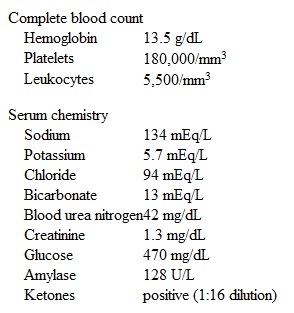A 28-year-old man comes to the emergency department due to a 2-day history of polyuria, polydipsia, abdominal pain, nausea, and vomiting. He was diagnosed with primary adrenal insufficiency 6 months ago after developing fatigue and weight loss. The patient was started on hydrocortisone and fludrocortisone at that time, resulting in improvement of symptoms and return to baseline weight. Medical history is otherwise unremarkable. The patient's mother had Graves disease treated with radioiodine, and his sister has hypothyroidism. Family history is negative for diabetes mellitus. The patient does not use tobacco, drinks "a few beers on weekends," and used marijuana occasionally during college. Temperature is 36.9 C (98.4 F) , blood pressure is 90/65 mm Hg, pulse is 115/min, and respirations are 22/min. BMI is 22 kg/m2. Oral mucous membranes are dry, and the abdomen shows mild diffuse tenderness with no peritoneal signs. Laboratory results are as follows:  What is the most likely cause of this patient's hyperglycemia?
What is the most likely cause of this patient's hyperglycemia?
A) Glucocorticoid-induced diabetes mellitus
B) Maturity-onset diabetes of the young
C) Pancreatitis-induced diabetes mellitus
D) Type 1 diabetes mellitus
E) Type 2 diabetes mellitus
Correct Answer:
Verified
Q193: A 65-year-old male comes to the emergency
Q194: A 16-year-old girl is brought to the
Q195: A 38-year-old man with type 1 diabetes
Q196: A 7-year-old boy is brought to the
Q197: A 13-year-old girl comes to the physician
Q199: A 2-year-old boy is brought to the
Q200: A 62-year-old man comes to the office
Q201: A 35-year-old woman, gravida 3 para 3,
Q202: A 30-year-old woman comes to the office
Q203: A 4-year-old girl presents to the pediatrician
Unlock this Answer For Free Now!
View this answer and more for free by performing one of the following actions

Scan the QR code to install the App and get 2 free unlocks

Unlock quizzes for free by uploading documents